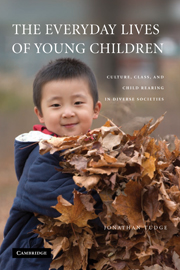Book contents
- Frontmatter
- Contents
- Preface
- Acknowledgments
- 1 Introduction and Stage Setting
- 2 The Daily Lives of Toddlers
- 3 Cultural–Ecological Theory and Its Implications for Research
- 4 Methods
- 5 Life in the Cities
- 6 Everyday Activities
- 7 Settings and Partners
- 8 Everyday Lives
- 9 The Cultural Ecology of Young Children
- References
- Index
2 - The Daily Lives of Toddlers
Published online by Cambridge University Press: 25 July 2009
- Frontmatter
- Contents
- Preface
- Acknowledgments
- 1 Introduction and Stage Setting
- 2 The Daily Lives of Toddlers
- 3 Cultural–Ecological Theory and Its Implications for Research
- 4 Methods
- 5 Life in the Cities
- 6 Everyday Activities
- 7 Settings and Partners
- 8 Everyday Lives
- 9 The Cultural Ecology of Young Children
- References
- Index
Summary
Our deeds still travel with us from afar, and what we have been makes us what we are.
George Eliot, Middlemarch, 1872/1988, p. 575As I pointed out in the previous chapter, in many ways we know a great deal about young children. The pages of the leading North American journals are filled with studies featuring children of preschool age, and textbooks provide great detail about various aspects of young children's cognitive, moral, and socioemotional development. What we don't know a great deal about is how young children spend their time, with whom, doing what, in what types of settings. My goal in this chapter is not to try to provide a comprehensive account of what we know about young children's development in different parts of the world; to achieve that goal would take rather more space than this volume provides. My aims are rather more limited. First, I want to show that there are indeed major differences in children's lives in industrialized societies and in societies that form part of the majority world. Second, I want to describe some of the heterogeneity that exists within any society, whether from the industrialized or majority world.
As I argue in Chapter 3, what really matters for development is what one does on a regular basis, with those people and objects one spends time with. This is hardly a new thought; Aristotle wrote in the fourth century b.c. that “virtue of character results from habit” (1985, p. 33), and in the 1870s George Eliot wrote much the same thing in the epigraph at the start of this chapter.
- Type
- Chapter
- Information
- The Everyday Lives of Young ChildrenCulture, Class, and Child Rearing in Diverse Societies, pp. 22 - 55Publisher: Cambridge University PressPrint publication year: 2008

